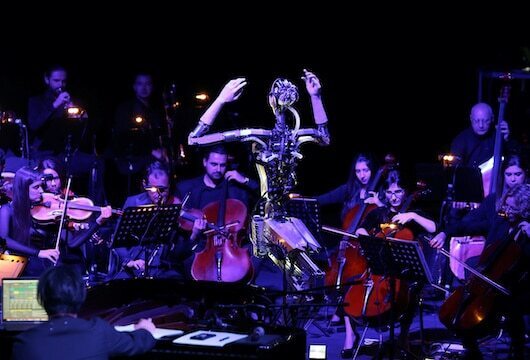
C3S: July 22 hottest day in recent history
July 22 was the hottest day on earth in recent history, according to the Copernicus ...

The world has marked a breakthrough in developing artificial intelligence (AI) as a robot with a humanoid face conducted human orchestra during a live concert of Keiichiro Shibuya’s opera “Scary Beauty” in Sharjah of the United Arab Emirates on February 4, 2020.
The robot was seen moving his hands and even fingers to conduct human musicians. The robot was also able to move around to control the whole orchestra.
Japanese composer Shibuya wrote the music, but the android controls the tempo and volume of the live show, and even sings at times.
“This work is a metaphor of the relations between humans and technology. Sometimes the android will get crazy, human orchestras have to follow. But sometimes humans can cooperate very comfortably,” Shibuya said.
The robot’s technician Kotobuki Hikaru said “The premise is that the android itself is moving according to its own will.”
The work’s lyrics are based on literary texts from American “Beat Generation” writer William Burroughs and French author Michael Houellebecq.
“The robots and AI that exist now are not at all complete. The focus of my interest… is what happens when this incomplete technology comes together with art,” said Shibuya.
Some of the audience saw the experiment as fascinating and others preferred the human conductor saying that the human touch was lost.
This was not the first time for a robot conductor of human orchestra. A previous experiment was conducted in 2017, but at this time artificial intelligence was not as developed as today’s technology.
During a robotics fair in the Tuscan city of Pisa, humanoid robot YuMi conducted classical musicians and singers but the robot’s range of movement was learned by imitation.
The two-arm robot YuMi – manufactured by the Swiss company ABB – made its conducting debut at the Verdi Theater, conducted three of the 18 pieces performed by the Lucca Philharmonic Orchestra.
They included the famous aria La Donna e’ Mobile, from Verdi’s opera Rigoletto, sung by Bocelli.
YuMi was taught its movements by the orchestra’s regular conductor Colombani. He held the robot’s two arms in rehearsals so Yumi’s computer could memorize the right gestures.
Yumi’s smooth, human-like movements marked at this time a big improvement on its Honda-built “rival” Asimo, which conducted the Detroit Symphony Orchestra in 2008. Asimo had a very limited up-and-down, one arm movement.
Artificial intelligence is beneficial in many scores, but the question here shall artificial intelligence be favored this time in the realm of music?
Music conductor is not only conducting musicians to play right notes. The conductor is always having contact with the audience.
Audience and musicians will always compare their feeling with a robot conductor and human conductor.
The contact between human conductor with musicians on the one hand and audience on the other hand was manifested in a concert by Egypt’s legendary composer Omar Khairat and talented conductor Nader Abbasi.
The video of this concert went viral, especially in the Arab world, on social media and it is still cherished by many of music lovers.
In this concert, Nader Abbasi managed to use his talent as a conductor to get the audience to be part of the show, where he started to conduct the audience to clap their hands at certain parts to add flavor to the piece being played.
The audience were happy to share the musicians their show and they were committed to the signs given by Abbasi.
This was one of the most successful concerts of Omar Khairat and Nader Abbasi.
Technology and artificial intelligence were of a great boon to humanity, but they should be in the right place. Comparing the video of Omar Khairat concert conducted by Nader Abbasir and the one conducted with the robot. The flavor of music is totally different and the interaction between audience and conductor is unique.
In exclusive statements to CSR Egypt, Professor of Music Criticism at the Egyptian Academy of Arts Zein Nassar said the experiment of robot conductor shows off technological development in manufacturing robots that can even be considered as a miracle, but whatever the robot can do, it can never reach the human innovation and creation in artistic work.

He expounded that human conductor has contact with his body language and facial expressions with the musicians and audience and this affects the impression of the audience about the musical piece being played.
Music is a very complicated art whether playing or conducting it. Finally, it is art and the human touch is completely lost with the robot-conductor, he said.
The experiment is nice reflecting the creativity and innovation in manufacturing robots, but this is art and the human touch is indispensable, he concluded.
July 22 was the hottest day on earth in recent history, according to the Copernicus ...
Google has engaged in partnership with DHL to utilize the DHL Express GoGreen Plus service ...
Mars has announced registering a record 8% greenhouse gas (GHG) emissions reduction against its 2015 ...


اترك تعليقا